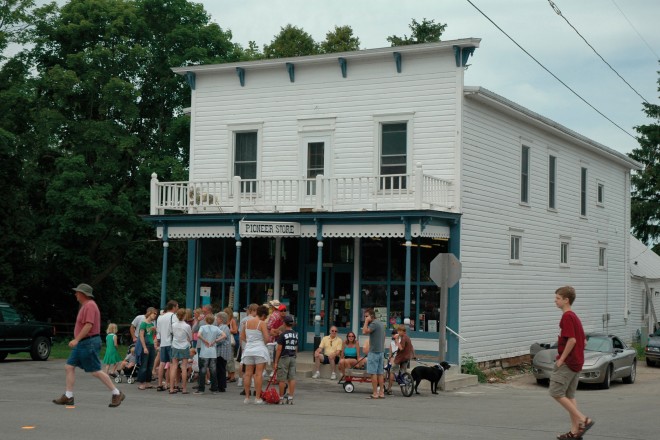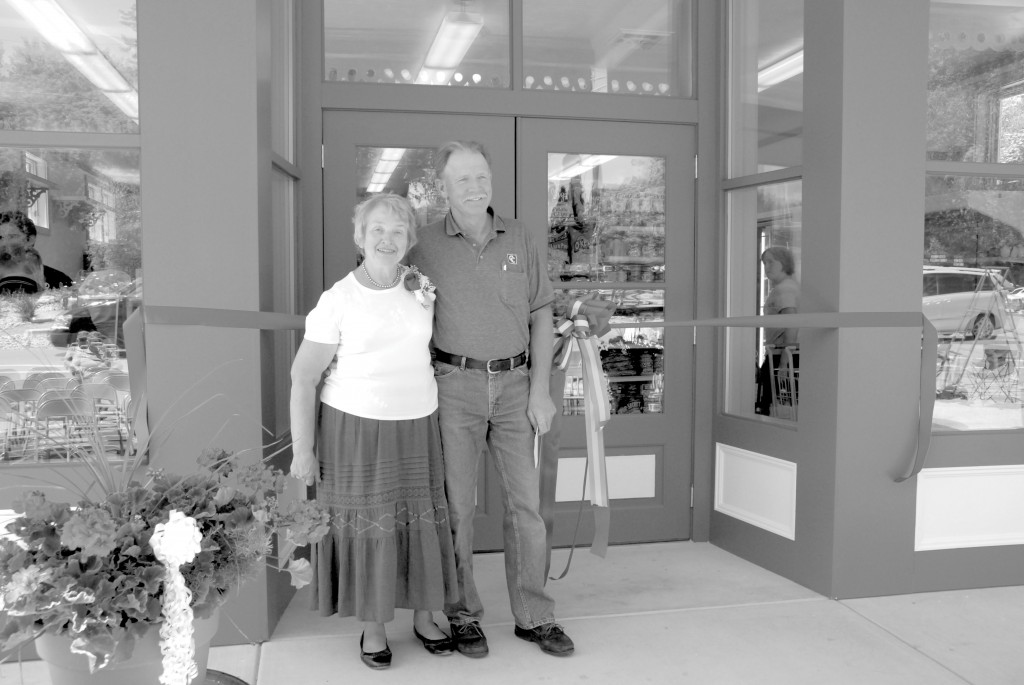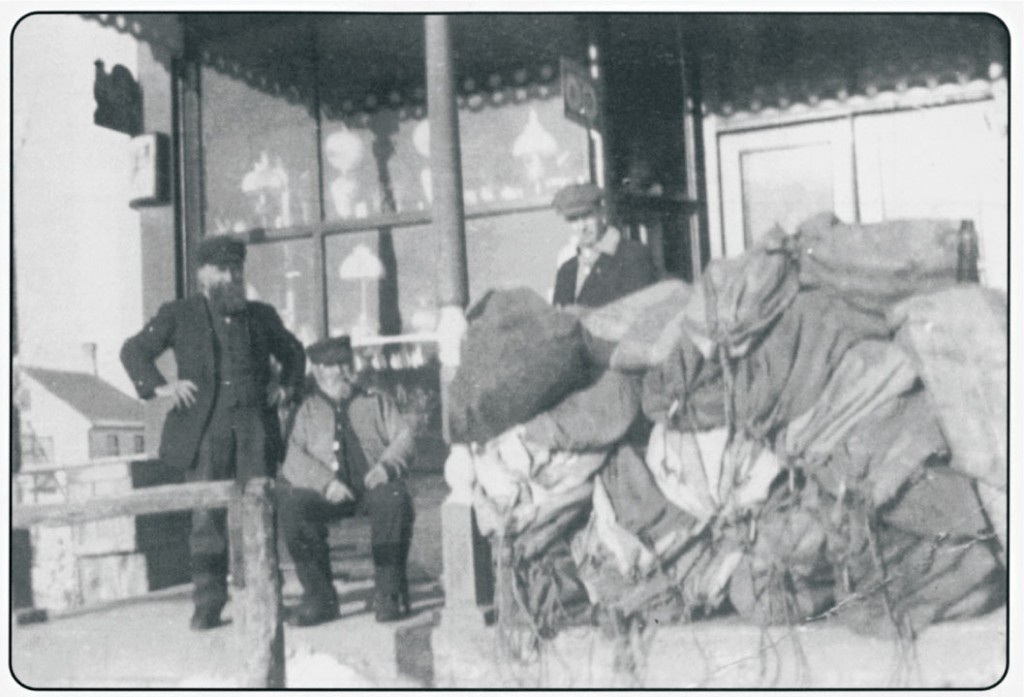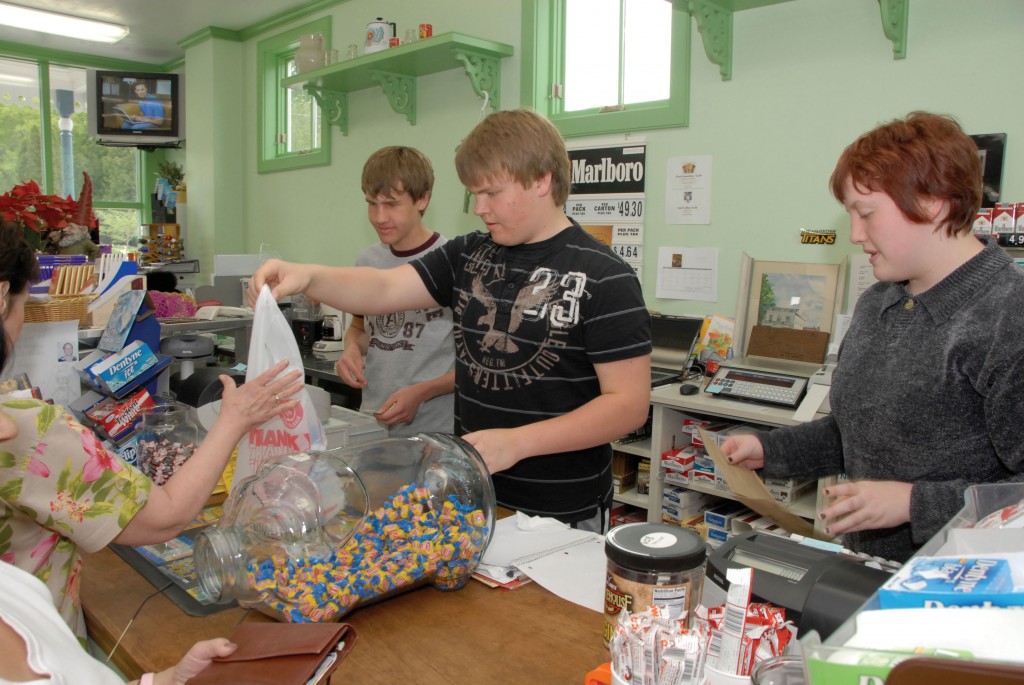The Center of Life in Ellison Bay
- Share
- Tweet
- Pin
- Share

The sign above the front porch has read Pioneer Store for 40 years, but if you ask almost any resident of Ellison Bay if you could find a needed item at Ruckert’s, they’d know just what you meant. And the answer would likely be “yes” – whether you were referring to the store of 2008 or the one established by Charlie Ruckert in 1900. The original store, by the way, was to have had two owners – Ruckert and Hans Hanson, but the partnership dissolved before the business opened because the gentlemen couldn’t agree on whose name should come first on the sign. Because of the cost of buying out his erstwhile partner, Ruckert had to borrow money to stock the shelves.
Although Charlie needed cash to open his store, he never demanded it of his customers. Nearly everyone bought on credit, with the amount of each purchase noted in a little book with the family name on the front. Charlie never sent bills, but it was understood that accounts would be settled at the end of each month. Sid Telfer remembers that a family who worked in his father’s orchards kept their own record, showing the value of the butter, eggs and potatoes they’d traded to the store for sugar, salt and shovels.
Memories of the 1920s are still fresh in the minds of octogenarians who spent their childhood “running down to Ruckert’s” for a spool of thread from the Coates display case, an onion or a dozen eggs. The massive counters, scarred with dings from falling cans, the Detroit Automatic Scale, the manual cash register and the party-line telephone are things every former customer remembers. As children, they loved to spend lazy afternoons seeing how high they could swing in the two-seated glider in the yard or spinning on the stools in front of the counters, where housewives could rest as they mulled over bolts of calico or waited for their grocery order to be filled.

From 1903 to 1915 the store served as Ellison Bay’s post office. Ruckert’s telephone was one of just four in the village, and they were happy to take messages for residents, as well as for people who owned the summer cottages.
A little cellar about five feet deep had thick stone walls that kept canned goods from freezing in the winter. In the summer, a large pan of ice was used to keep fruits, vegetables and dairy products cool. Robert Anderson says his father told a story about the jug of moonshine Charlie Ruckert also kept on the steps leading to the cellar. Regular customers knew it was there, and Charlie permitted them a nip now and then. One day a fellow said he’d like a drink and Charlie, forgetting that he’d also left a jug of muratic acid on the steps, told him to help himself. In the dark, the gentleman picked up the wrong jug and took a generous swig. According to Robert’s father, “It didn’t kill him, but he did suffer from stomach problems the rest of his life!”
The pot-bellied stove was the favorite gathering place in the village for old men to swap stories, whittle and chew tobacco. If Pretty or Katie, the Ruckerts’ cats, had new kittens, their box was close to the stove, too. Kerosene lamps lit the store until the 1920s.
The eggs customers bought came from local farmers, along with home-grown potatoes, strawberries and cherries in season. In Charlie Ruckert’s day, everything else was delivered by boat and unloaded into a building near the dock called “the elevator.” A generation later, as roads improved, butter and milk came from a dairy in Sturgeon Bay and other items from suppliers in Green Bay and Milwaukee. Ruckert’s house brand was Volunteer, distinguishing it from another local grocery that sold Clover Farm canned goods.
Charlie operated the store until 1929, when he turned it over to his son, Walter, and daughter-in-law, Jean. Their daughters, Janice and Phyllis, grew up in the store, living upstairs as their grandparents had done. If Walter needed help with customers, he pulled the string of a bell that rang upstairs, summoning Jean. Janice, now in her 80s, remembers learning to roller skate around the counters on Sunday afternoons with her sister and their best friend, Dottie Telfer Sladky, and playing hide-and-go-seek in the abandoned “elevator.”

“Oh, man, what you could buy there was incredible,” says Lon Kopitzke. “Everything from fishing tackle to hardware, boots, shoes, brooms and stove pipe.” Annette Wickman, who with her husband, Lawrence, owned the Viking Grill from 1947 to 1975 and started the first fish boils in Door County in 1961, remembers 50-pound bags of flour, tables full of coffee, crackers and cookies, candy in big glass jars and barrels of pickles and pickled herring.
Hams hung from the ceiling and prunes, raisins and peanuts were sold by the pound. The cheese case held a huge round of cheddar. When customers needed vinegar or kerosene, they brought their own containers to be filled from barrels. At Christmas, a magical array of candy awed young customers. Once marked, prices never seemed to change. Gen Follingstad, whose father built the original section of the Viking Grill, remembers buying an embroidery hoop in the 1950s that was still priced at 10 cents.
Dorothy Peterson, an Ellison Bay resident for all her 91 years, remembers that Walter Ruckert checked the outside temperature every morning and recorded it on a chart inside the store. Jean established a little lending library, stocked by the county bookmobile.
“Ruckert’s was our lifeline,” Wickman says. “If we ran out of hamburger in the middle of lunch, one of the kids could run across the road and get ten pounds ground to order.” Dan Peterson, the Viking’s current owner, says, “That’s still true. Pioneer Store is our pantry!”
Sam Hanson, whose great-grandfather almost became Ruckert’s partner, began stocking shelves at Ruckert’s when he was 10, like his 10 older brothers and sisters and nearly every other child in Ellison Bay. By 14, he was using an old Durant automobile to deliver the chunks of ice his father cut on the bay every winter and stored in sawdust in Ruckert’s icehouse. Sam pointed out that he had no driver’s license, but Walter said it made no difference, as long as he stayed in Ellison Bay.

The store had no regular delivery service for groceries, but if the residents of vacation cottages bought more then they could carry in a pillowcase, some of the young employees walked with them with the extra bags. Sam didn’t mind making deliveries; the job he dreaded was emptying the spittoon!
Both Hanson and Sladky remember that they loved to pump gas for customers from the two big tanks in front of the store. The requested amount was pumped into the big glass globe on top of the tank, and gravity took it down to the car. This system didn’t work in summer, however, because the gas would expand and overflow.
Telfer and Sladky also have stories about Charlie Ruckert’s daughter, Gertie, who clerked in the store and was seldom without a dust rag in her hand. They remember how careful she was to measure bulk items exactly. “If you asked for a pound of cookies and the weight was an ounce or two over, she’d break a cookie in half,” Sid says.
Kopitzke remembers that he was just seven when he started going to Ruckert’s to buy cigarettes for his father, a serious smoker who always planned to quit and thus refused to buy them for himself. No carding in those days!
Walter Ruckert died in 1954, and Jean operated the store alone for 14 years. In 1968 she sold it to Lester and Carol Newman. Carol’s family had operated Alwes’ Grocery in Fish Creek for many years. “A general store was in my blood,” Carol says. Lester, principal of the Sister Bay School, had stocked shelves at Ruckert’s as a youngster. Harvey and Rita Stahl remember that he often sat at the counter and graded papers when business was slow.
Today Carol sells a wide variety of newspapers, all of them available on the day they’re printed. It was not always the case. The Reverend Don Heeringa tells the story of a tourist who bought a paper and exclaimed, “Why, this is yesterday’s!” “Oh,” responded Lester, “were you wanting today’s? Come back tomorrow!”

At 2:30 am on July 10, 2006, the store literally came crashing down around Carol – the walls of the ground floor were blown outward as a result of a gas explosion at the Cedar Grove Resort across the road. Carol, who had been sleeping in the upstairs apartment, was rescued from a second-floor window by First Responders.
The loss of the store would have been a tragedy for the community. “Everyone was overwhelming supportive that Carol rebuild,” Kopitzke says. “The Pioneer Store is just such an important part of Ellison Bay.” Someone who cared less than Carol Newman might have decided to retire with memories of 38 happy years, but the store reopened just a year later. The pot-bellied stove, the century-old counters and the spinning stools are gone, as is the treasure trove of samples of bygone merchandise.
But the outside is an exact duplicate of the 1900 structure, the cheerful service remains and, as a long-ago magazine article noted, “You can probably outfit yourself, your children and your pet without moving more than six feet in any direction.” An unexpected find were frozen White Castles, manna for this expatriate St. Louisan!
Today, as it’s been for 108 years, the Pioneer Store is the center of life in Ellison Bay, the little community Dan Peterson describes fondly as “five miles north of Sister Bay and 15 years back in time.”


